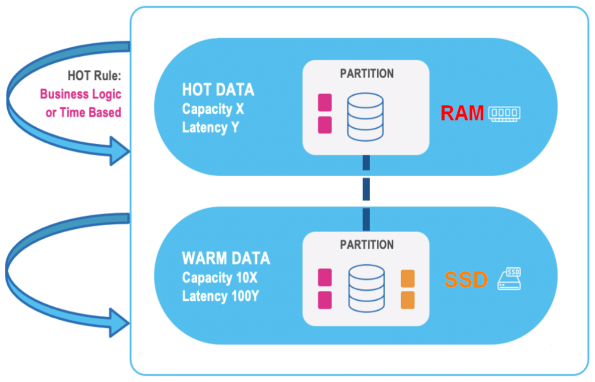Data Persistency in Tiered Storage
Tiered Storage![]() Automatically assigns data to different categories of storage types based on considerations of cost, performance, availability, and recovery. stores data in a permanent repository. The data can be saved when the tiered storage is undeployed, and restored when it is redeployed.
Automatically assigns data to different categories of storage types based on considerations of cost, performance, availability, and recovery. stores data in a permanent repository. The data can be saved when the tiered storage is undeployed, and restored when it is redeployed.
Why Use Data Persistency?
The initial loading of data into each tier can be a time-consuming process, starting with the System of Record or other external data sources. Additionally, data in both tiers can be updated during the normal course of operations during the day.
During the normal use of Tiered Storage, priority data is stored in the Hot tier, and other data is stored in the Warm tier![]() Part of GigaSpaces Tiered Storage Mechanism. Warm tier is SSD (recommended media) storage which is mostly used for data that is read-only and is less frequently used.:
Part of GigaSpaces Tiered Storage Mechanism. Warm tier is SSD (recommended media) storage which is mostly used for data that is read-only and is less frequently used.:

For an explanation of Tiered Storage and instructions for configuration, see What is Tiered Storage?
Using data persistency, data in both tiers is stored in a system repository. When the data is undeployed, the user has an option to persist the data. Subsequent redeployment of the data is performed at optimum speed.
The undeployed services can be viewed using the GET /pus/undeployed REST API![]() REpresentational State Transfer. Application Programming Interface
An API, or application programming interface, is a set of rules that define how applications or devices can connect to and communicate with each other. A REST API is an API that conforms to the design principles of the REST, or representational state transfer architectural style..
REpresentational State Transfer. Application Programming Interface
An API, or application programming interface, is a set of rules that define how applications or devices can connect to and communicate with each other. A REST API is an API that conforms to the design principles of the REST, or representational state transfer architectural style..
An example of sample output is shown below.
[
{
"name": "tiered-space",
"unDeployedAt": "2021-08-03T14:14:22.787",
"isPersistent": true,
"gracefulShutdown": true,
"lastPrimaries": [
{
"partitionId": 1,
"instanceId": "1_1"
}
],
"spaceInstancesHosts": [
{
"instanceId": "1_0",
"host": "127.0.1.1"
},
{
"instanceId": "1_1",
"host": "127.0.1.1"
}
],
"schema": "partitioned",
"numOfInstances": 1,
"backupsPerPartition": 1
}
]
The number of backups per partition is zero or one.
The data of undeployed services can be deleted using the DELETE /pus/undeployed/{id} REST![]() REpresentational State Transfer. Application Programming Interface
An API, or application programming interface, is a set of rules that define how applications or devices can connect to and communicate with each other. A REST API is an API that conforms to the design principles of the REST, or representational state transfer architectural style. API.
REpresentational State Transfer. Application Programming Interface
An API, or application programming interface, is a set of rules that define how applications or devices can connect to and communicate with each other. A REST API is an API that conforms to the design principles of the REST, or representational state transfer architectural style. API.